“A three-year-old educated according to Montessori pedagogy, becomes a master of his hand and undertakes with a joy a variety of human activities. These activities allow him to develop the power of concentration.” ~Dr. Montessori, San Remo Lectures
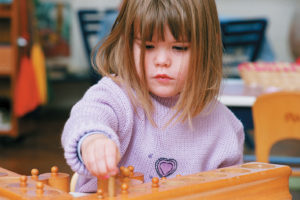
The Pre-K students enrolled through The Garden attend school in the multi-age Primary classrooms with Kindergartners at Moore Montessori Community School in Southern Pines. The Primary Classrooms serve up to 25 students and are led by a trained Montessori guide and an assistant. Children who are between the ages of 3 and 4 years as of August 31st are eligible for enrollment as a Pre-K student and attend half-days from 8am-12pm weekdays.
Our PreK program is currently full for the 23-24 School Year.
Please submit an application to be added tothe waiting list or to apply for future years.
Children in the primary classrooms participate in the 3-hour work cycle during which the guide will provide individual and small group lessons Students are free to choose and complete their work independently. The Montessori classroom offers hands-on learning through a wide variety of materials and exercises, specifically designed to meet the needs of children within this unique developmental phase. Each child works at their own pace through a three-year sequence of materials and exercises outlined briefly below.
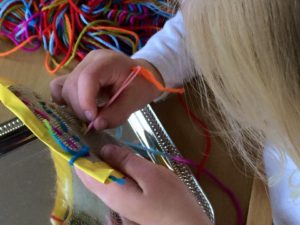
Practical Life exercises are the first things children are introduced to in a Primary classroom, they offer opportunities for children to practice and learn self-care, care of the environment and care of others, allowing for fine and gross motor development while building the child’s ability to concentrate. Children learn skills from pouring and polishing to embroidering and sewing… and everything in between.
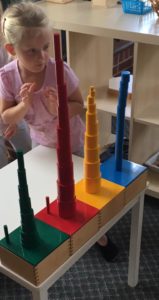
Sensorial materials are usually the next . Beautifully designed and aesthetically appealing to the child, these materials call out to students to be touched and explored. The senses are engaged through exercises in grading, sorting and comparing; offering opportunities to expand vocabulary and prepare the child for the language and math materials that follow.
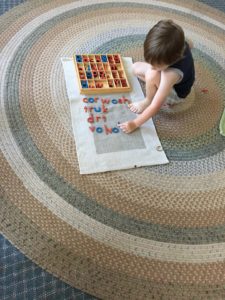
The Montessori approach to reading and writing is extremely unique and effective. Language lessons begin with simple sound games. Students then learn, in fun ways and with tactile materials, how to build words and begin “writing,” using a movable alphabet even before they will use a pencil and paper, these word-building exercises lead to reading and build the foundation for literacy, often at a very young age.
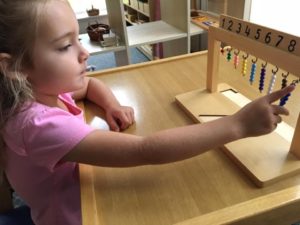
Students learn numbers and math using concrete materials including beads, cubes, wooden rods and tactile numerals. Math “lessons,” are games designed to engage even the youngest child in a Montessori classroom and allow children to discover math concepts from number identification all the way through division if and when they are ready. Since they are working at their own pace, students aren’t held back by the typical expectation for their age group and often learn concepts traditionally taught to older children.
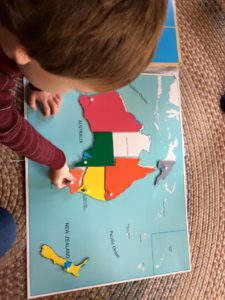
The cultural materials and exercises range widely from geography to science and history. Children learn about the world and their place within it through experiences with authentic and diverse materials that offer tangible information and teach students a deep love and respect for the earth and all creatures within it. Cultural exercises are often determined by the changing seasons or the unique interest of the students, taking advantage of the natural curiosity within the child and allowing them to explore topics as deeply as they choose.
Each concept in a Montessori classroom is isolated and introduced to the child in a very tangible way. Once they’ve had a presentation of an exercise, they can then practice as often as needed until the skill is mastered, or until their need for that work is satisfied. There is always more to learn, and because these trained guides tap into the child’s unique interests when presenting lessons, children are focused and happy to learn and to practice. The environment allows for children to develop intrinsic motivation without the need for rewards or punishments; Dr. Montessori found that the satisfaction of completing work and gaining a skill is all the child needs to feel inner peace and contentment. Because the children are focused on their own education, and because peace is a focus of the classroom, discipline problems in a Montessori classroom are rare but are always handled gently through lessons in Grace & Courtesy, and modeled consistently by the guides themselves.
Are you unfamiliar with the Montessori approach? Watch these short videos to learn more about this philosophy for early childhood education.
Learn more about MMCS:
You can view the charter application for MMCS online here:
http://www.dpi.state.nc.us/docs/charterschools/applications/18-19/moore.pdf
Follow MMCS on Facebook for updates! https://www.facebook.com/MontessoriforMooreCounty/?ref=bookmarks